Capitol riots: Who broke into the building?
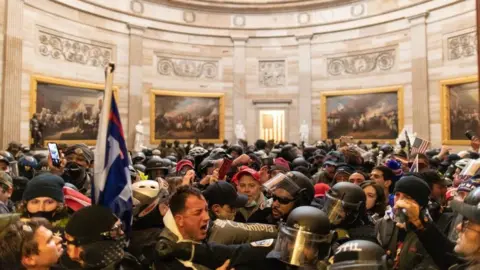 Getty Images
Getty ImagesWho were the protesters that broke into buildings on Capitol Hill after attending a rally in support of Donald Trump?
Some were carrying symbols and flags strongly associated with particular ideas and factions, but in practice many of the members and their causes overlap.
QAnon among the protesters
Images show individuals associated with a range of extreme and far-right groups and supporters of fringe online conspiracy theories, many of whom have long been active online and at pro-Trump rallies.
One of the most startling images, quickly shared across social media, shows a man dressed with a painted face, fur hat and horns, holding an American flag.
He's been identified as Jake Angeli, a well-known supporter of the baseless conspiracy theory QAnon. He calls himself the QAnon Shaman.
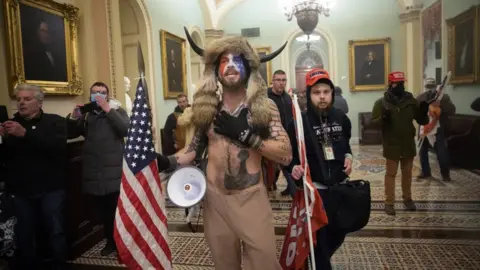 Getty Images
Getty ImagesHis social media presence shows him attending multiple QAnon events and posting YouTube videos about deep state conspiracies.
He was pictured in November making a speech in Phoenix, Arizona, about unproven claims the election was fraudulent.
His personal Facebook page is filled with images and memes relating to all sorts of extreme ideas and conspiracy theories.
The Proud Boys
Another group spotted at the storming of the Capitol were members of the far-right group Proud Boys.
The organisation was founded in 2016 and is anti-immigrant and all male. In the first US presidential debate President Trump in response to a question about white supremacists and militias said: "Proud Boys - stand back and stand by."
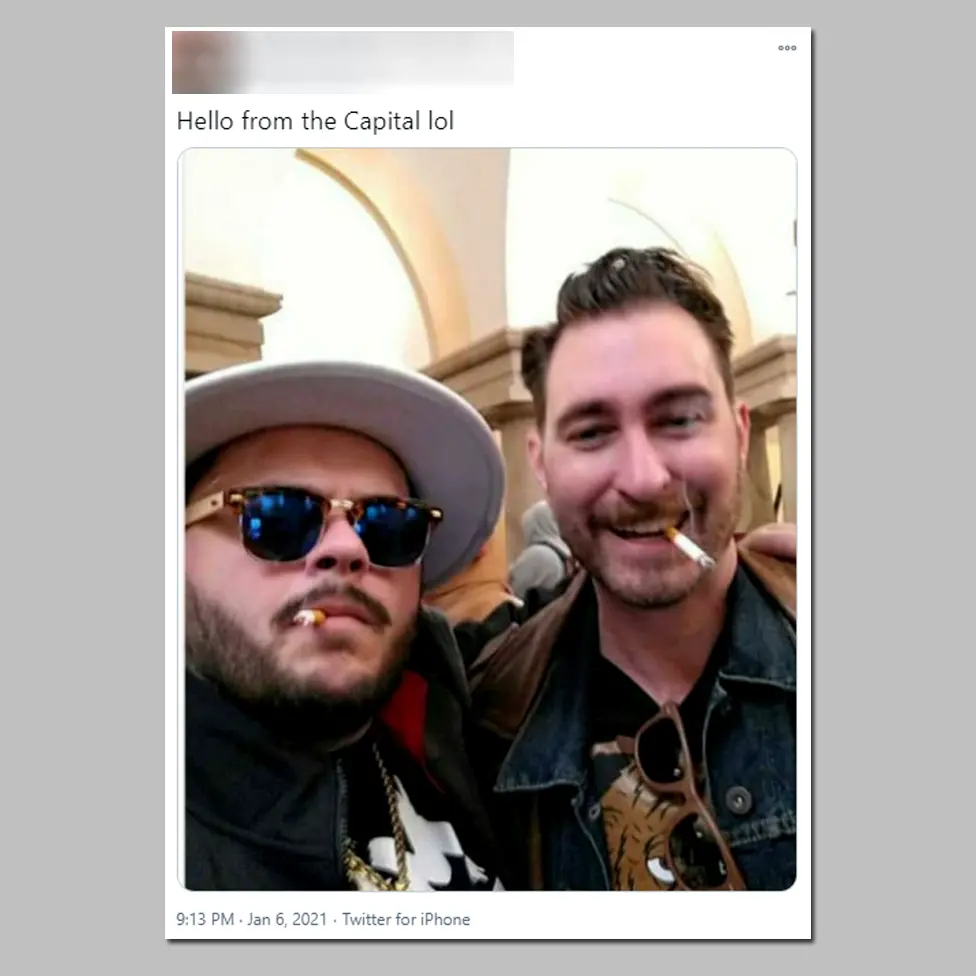
One of their members, Nick Ochs, tweeted a selfie inside the building saying "Hello from the Capital lol". He also filmed a live stream inside.
We haven't identified the individual standing on the left in the above image.
Mr Ochs' profile on the messaging app Telegram describes himself as a "Proud Boy Elder from Hawaii."
Online influencers
Individuals with large followings online were also spotted at the protests.
Among them was the social media personality Tim Gionet, who goes under the pseudonym "Baked Alaska".
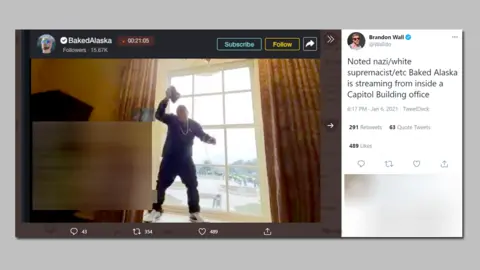 Twitter
TwitterHis livestream from inside the Capitol posted on a niche streaming service was watched by thousands of people and showed him talking to other protesters.
A Trump supporter, Mr Gionet has made a name for himself as an internet troll.
He's been described by the Southern Poverty Law Centre, a US nonprofit legal advocacy group, as a "white nationalist", a label he disputed in a comment to The Insider.
YouTube banned his channel in October after he posted videos of himself harassing shop workers and refusing to wear a face-mask during the coronavirus pandemic.
Other platforms that have previously shut down his accounts include Twitter and PayPal.
Who wrote Nancy Pelosi a note?
A photo that went viral of a man who'd entered the office of senior Democrat politician Nancy Pelosi has been named as Richard Barnett from Arkansas.
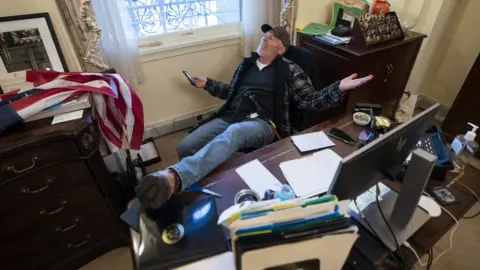 EPA
EPAOutside Capitol Hill buildings, he told the New York Times that he took an envelope from the speaker's office and says left a note calling her an expletive.
Allow X content?
Reacting to the New York Times interview, Republican congressman Steve Womack said on Twitter: "I'm sickened to learn that the below actions were perpetrated by a constituent."
Local media reports say Mr Barnett is involved in a group that supports gun rights, and that he was interviewed at a 'Stop the Steal' rally following the presidential election - a movement that refused to accept Joe Biden's victory and supports the president's unsubstantiated claims of electoral fraud.
In the interview at the rally organised by 'Engaged Patriots' he said: "If you don't like it, send somebody out to get me 'cause I ain't going down easy."
The group associated with Mr Barnett held a fundraiser in October with proceeds going towards body cameras for the local police department, according to the Westside Eagle Observer local paper.
No evidence of antifa supporters
As the events were unfolding, many social media users, especially those associated with QAnon and supporters of President Trump, were claiming that agitators from the loose-knit left-wing group antifa were involved.
The implication was that these activists were disguised as Trump supporters to create disruption.
A number of prominent Republican politicians, such as US Representative Matt Gaetz, claimed it was antifa masquerading as Trump supporters.
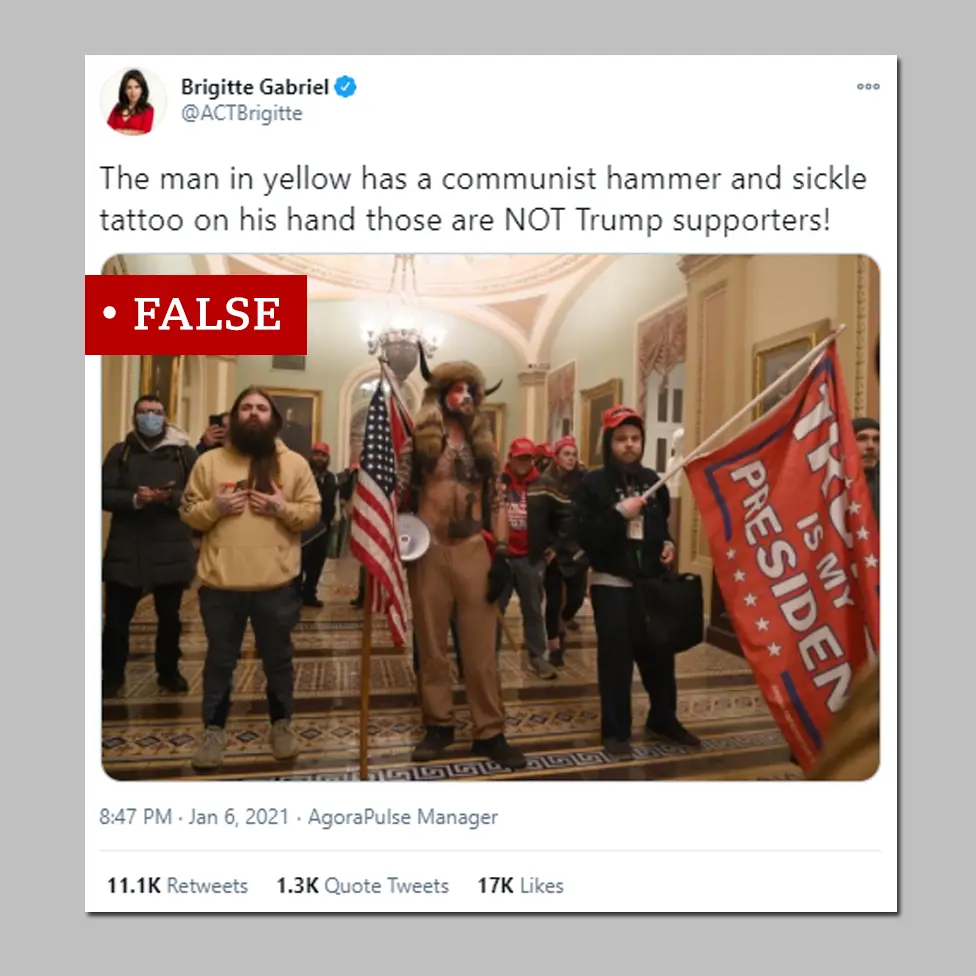
One widely-shared post claimed one protester had a "communist hammer" tattoo, as evidence that he wasn't a Trump supporter.
On closer inspection, the symbol is from the video game series Dishonored.
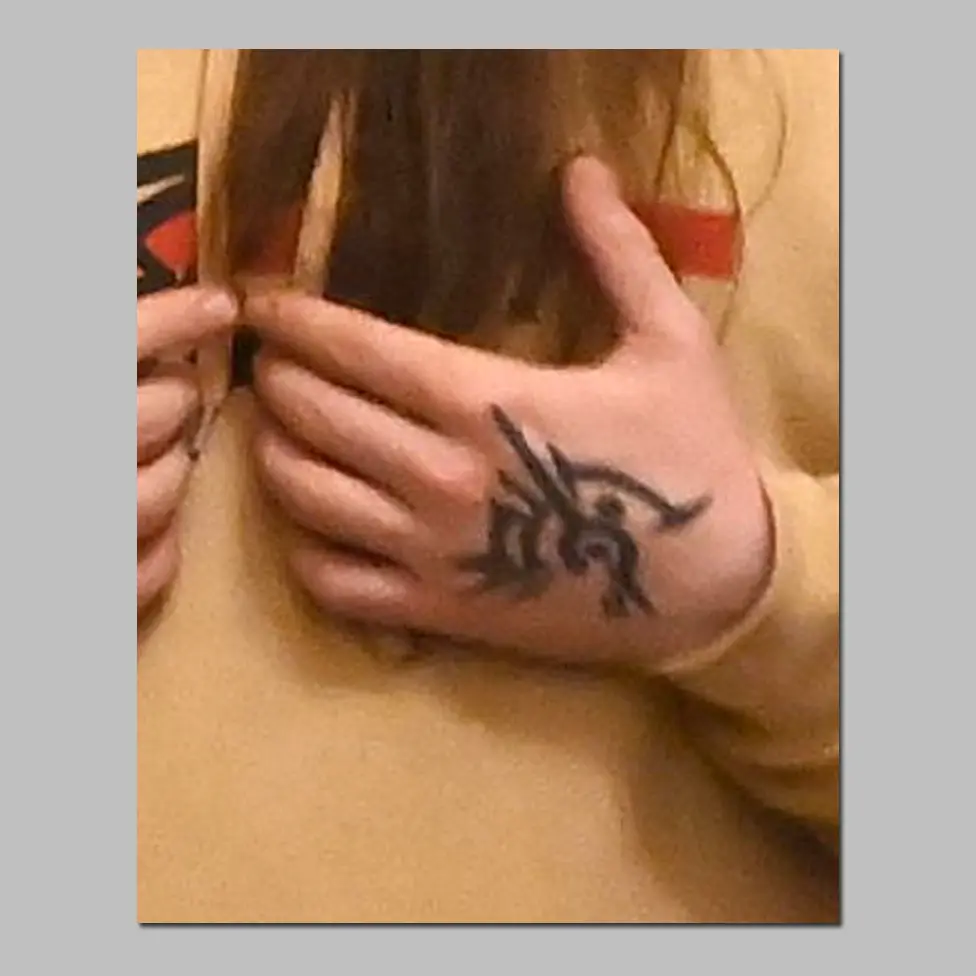
There have also been suggestions that Mr Angeli, the man wearing fur and horns, was a Black Lives Matter supporter, with users sharing an image of him at a BLM event in Arizona.
Mr Angeli was indeed at that event, but he was there as a counter-protester. In images taken there, he's seen holding a QAnon sign.
Flags and symbols
At least one of the rioters was holding a Confederate flag, which represented US states that supported the continuation of slavery during the American civil war. For this reason, it is considered by many to be a symbol of racism and there have been calls to ban it across the US. Others see it as an important part of southern US history.
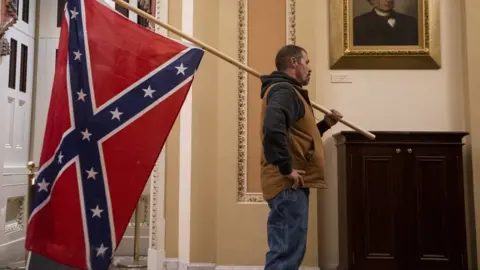 EPA
EPAIn July it was announced that the flag could no longer be flown on American military properties because of a new policy to reject "divisive symbols".
President Trump has defended the use of the Confederate flag in the past, saying: "I know people that like the Confederate flag and they're not thinking about slavery...I just think it's freedom of speech."
There were also protesters holding aloft flags featuring a coiled rattlesnake on a yellow background, often accompanied by the phrase "don't tread on me". This is known as the Gadsden flag, harking back to the American revolution and the war to expel British colonialists.
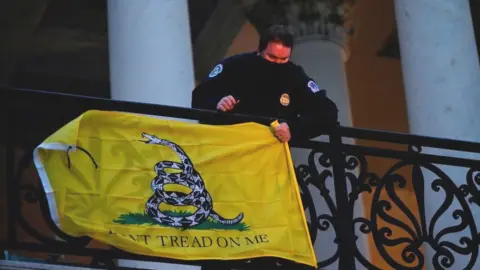 Getty Images
Getty ImagesIt was adopted by libertarians in the 1970s, according to an article in the New Yorker, and more recently became a favourite symbol of conservative Tea Party activists.
The flag has been adopted by the right over the past couple of decades, says Prof Margaret Weir, a political science expert at Brown University.
It is also used by anti-government, white supremacist groups who embrace violence, she says.
Reporting by Jack Goodman, Christopher Giles, Olga Robinson and Shayan Sardarizadeh.

